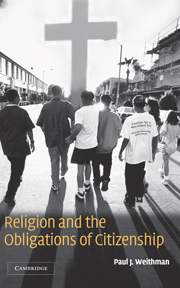Book contents
- Frontmatter
- Contents
- Preface and acknowledgments
- Introduction
- 1 Participation, full participation and realized citizenship
- 2 Religion's role in promoting democracy
- 3 Conceptions of the democratic citizen
- 4 Public argument
- 5 The principles
- 6 Robert Audi on secular reasons
- 7 John Rawls on public reason
- Conclusion
- Select bibliography
- Index
2 - Religion's role in promoting democracy
Published online by Cambridge University Press: 22 September 2009
- Frontmatter
- Contents
- Preface and acknowledgments
- Introduction
- 1 Participation, full participation and realized citizenship
- 2 Religion's role in promoting democracy
- 3 Conceptions of the democratic citizen
- 4 Public argument
- 5 The principles
- 6 Robert Audi on secular reasons
- 7 John Rawls on public reason
- Conclusion
- Select bibliography
- Index
Summary
In the first chapter I introduced the notions of participation and full participation in liberal democratic society. These and the related concepts of participant and full participant are, I stressed, politically contested. Citizens of liberal democracies contest who should be accorded the status of full participant, what rights, privileges and responsibilities participation and full participation ought to confer, and which of these rights, privileges and responsibilities liberal democratic states should guarantee. I suggested a view of full participation according to which full participants should have and know they have certain realistically available opportunities for education, meaningful work, cultural enrichment and political participation. A particularly important element of full participation, I argued, is what I called “realized citizenship.” Someone realizes her citizenship when she has realistically available opportunities to take part in the political life of her society and effectively identifies with her citizenship.
I introduced the notions of participation, full participation and realized citizenship to set the stage for the arguments of this chapter. Here I will look at what empirical investigation shows about the role religion and religious institutions actually play in democracy. Focusing on the example of the United States, I will argue that they make valuable contributions to democracy. These contributions, I shall suggest, help to produce the religious political argument and activity with which I am concerned. While I shall mention a number of contributions, there are two sorts I shall highlight.
- Type
- Chapter
- Information
- Religion and the Obligations of Citizenship , pp. 36 - 66Publisher: Cambridge University PressPrint publication year: 2002



